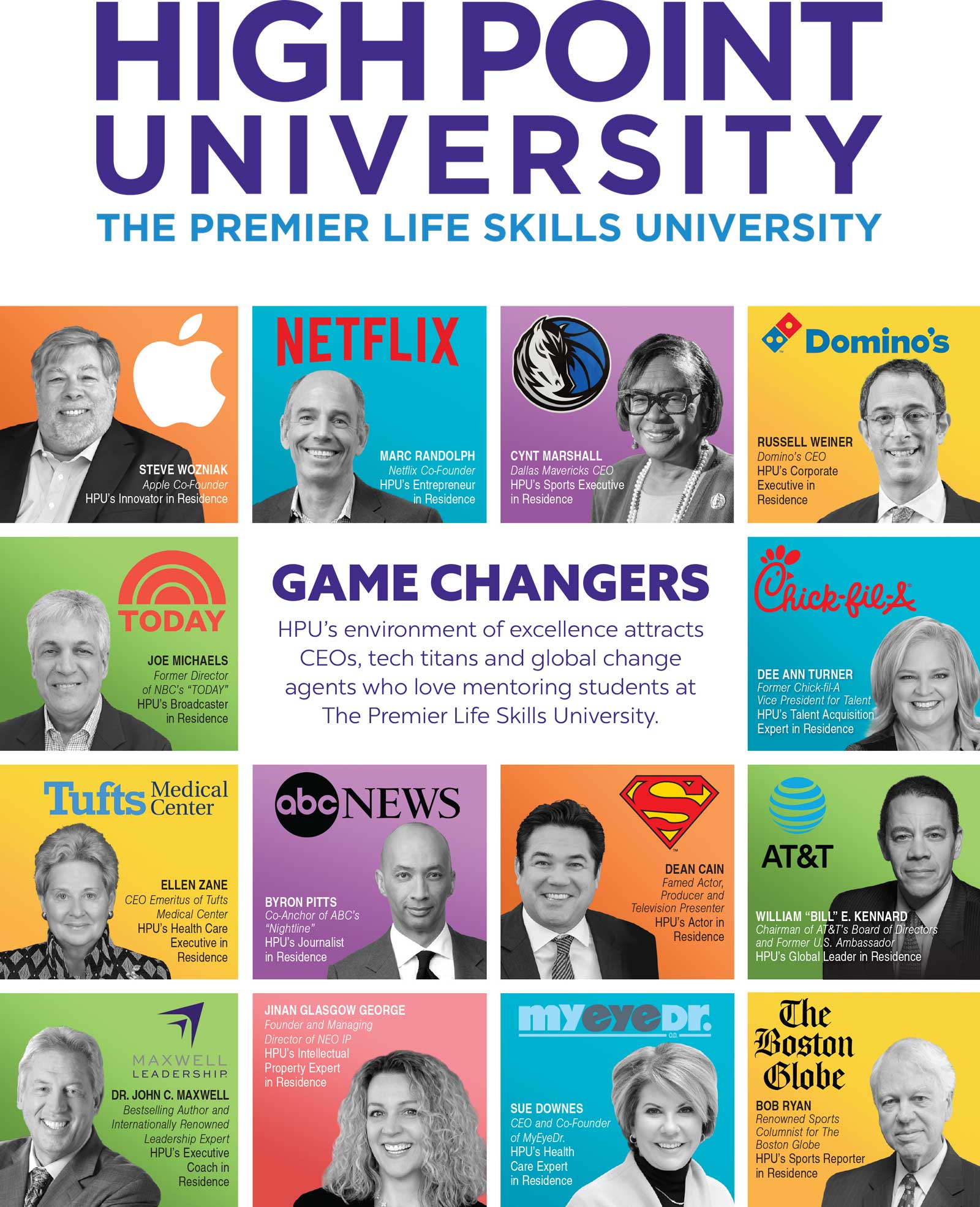Over the weekend, I received my copy of The Austin Business Journal wrapped in a plastic sleeve with a 144-page magazine titled High Point University – The Premier Life Skills University 2023.
If “A picture’s worth a thousand words”, the 14 pictures on the cover page depicting the 14 celebrities/executives who have served as High Point University’s (HPU) Innovator in Residence, Entrepreneur in Residence, Sports Executive in Residence, Corporate Executive in Residence, Broadcaster in Residence, Talent Acquisition Expert in Residence, Health Care Executive in Residence, Journalist in Residence, Actor in Residence, Global Leader in Residence, Executive Coach in Residence, Intellectual Property Expert in Residence, Health Care Expert in Residence, and Sports Reporter in Residence could probably qualify 14 times over.
The magazine is organized in 4 content areas: academic innovation, premier life skills, experiential learning, and values-based education. These areas are also the four pillars that distinguish HPU’s educational model from others and prepare their graduates to succeed.
In the academic innovation section, I learned about a master’s degree in communication and business leadership that is tuition-free for students living on campus and graduates of HPU. I found a web page with a description of the program but not how much the program costs.
An article about record-breaking enrollment and expansion touts High Point’s record fall 2022 enrollment of 6,000 undergraduate and graduate students as well as a $400 million expansion that is underway. HPU plans to launch the following schools: School of Law (fall 2024), School of Nursing (inaugural class started in Fall 2022), School of Entrepreneurship (no date), School of Dentistry (fall 2024), and a School of Optometry (no date). HPU will build a $80 million library, a $80 million dormitory housing 400 students, and 32 new student houses supporting 140 students.
During President Nido Qubein’s 17-year tenure, High Point has increased its total enrollment from 1,673 to 6,000, full time faculty from 108 to 353, campus size from 91 acres to 520 acres, square footage from 650,000 to 4.5 million, and operating and capital budget from $38 million to $378 million.
Pillar number two, Premier Life Skills, opens with an article touting the preferences of corporate CEOs to hire employees with life skills that outlast and extend beyond technical skills. HPU “empowers its graduates to communicate, build relationships, thrive in competitive environments, adapt amidst rapid change, and navigate complex situations without being intimated by life’s obstacles.” HPU also surveys CEOs to find out the characteristics that they’re looking for in employees and provides numerous mentorship and internship opportunities for students.
Pillar number three, Experiential Learning, accounts for approximately 25 percent of the academic hours in each major at HPU. HPU’s Access to Innovators Program began in 2016 and includes more than 20 influential leaders who spend time on campus and work with students. The section talks about the connections that students make in the game design industry, sports and events industry, teaching, arts and design, broadcasting industry, and astronomy among other areas.
Values-Based Learning is the fourth pillar and according to the publication, the foundation for every decision. An article titled “A Day in the Life” touts the campus facilities that HPU is known for. According to the article, 95 percent of HPU’s students live on campus all four years and one reason is that their dorms are ranked best in the nation. Students have two on-campus Starbucks, a bakery, a student center café, another café in the conservatory, nine fitness centers, an ice-skating rink with complimentary skate rentals, outdoor pools and hot tubs, a campus concierge, kiosks with complimentary grab-and-go drinks and snacks, weekly food trucks, and two fine dining restaurants, Alo and 1924 PRIME.
HPU has a student group, the Bonner Leader Program, that contributes 13,500 service hours to the community each year. This is supported by the 500,000 annual hours of service HPU students, faculty, and staff contribute.
In 2022, HPU earned the Sasser Cup, recognizing the university as the top overall athletics program in the Big South Conference, a NCAA Division I conference. HPU also offers 34 club sports teams.
Scattered throughout the magazine are articles about several donors whose gifts have enabled the construction of buildings as well as development of professional schools like the school of dentistry. More importantly, are the stories about students and alumni that are almost on every page of the publication. I earned a degree at three private universities and none of them features as many students and alumni stories as High Point University’s magazine.
I don’t know what it cost High Point to print and distribute copies of its 2023 magazine through the Business Journals in cities like Austin, but its president, Nido Qubein, has been willing to spend money during his 17-year tenure to attract students and build a new private university from the base of a small Methodist-affiliated college in High Point, North Carolina. I am willing to bet that there are very few traditional campus-based universities that have grown enrollment from 1,700 to 6,000 over the past 17 years.
Other than knowing where HPU is located, I was not familiar with its enrollment and financial statistics. College Navigator provided me with additional pieces of information that the magazine did not. Undergraduate tuition and fees and estimated books and supplies for the 2021-2022 academic year were $41,252. On-campus room, board, and other expenses totaled $18,156. Total estimated costs of attendance were $59,408. Approximately 90 percent of HPU’s entering freshmen received institutional grants or tuition discounts. Those grants averaged $15,032. Net price averaged $40,604. High Point University’s tuition discount percentage is much less than the national average 54.5 percent reported by NACUBO for the 2021-2022 academic year. Perhaps this is influenced by the fact that less than half (616 vs 1,385) of its freshmen borrowed money to attend. With a net price of $40,604, that implies that a higher-than-average income parents sends their children to HPU. It also implies that the lavish facilities combined with the life-focused curriculum attracts students whose parents can afford to pay the net price.
HPU accepts 80 percent of its applicants and 16 percent of those accepted choose to attend. Its graduation rate is 70 percent of those who start as freshmen. Its retention rate between the first and second year is 82 percent indicating that slightly more than half of the students who do not graduate, choose to leave HPU after freshman year. With 71 percent of the students who matriculate classified as out-of-state, it’s not a surprise that HPU chose to distribute its magazine via the Business Journals.
I also reviewed the university’s 2019 Form 990 that the IRS requires all non-profit organizations to file. Financially, the institution appears to be in very good shape with $813 million in assets versus $134 million in tax-exempt bonds issued to construct some of its facilities.
In an era where many private colleges and universities are experiencing declines in enrollment and negative financial issues, HPU appears to be thriving. While there are critics of universities that have spent money on “lazy rivers” and student centers with climbing walls, HPU has increased its campus facilities and academic programs while expanding its enrollment of students without granting steep student tuition discounts that put the university in a poor financial position.
Is HPU for everyone? No. It clearly doesn’t have the endowment riches that the elite private institutions do that enable them to provide full tuition grants for low-income families. At the same time, HPU’s curriculum, career and grad school outcomes for graduates (98 percent of its graduates are employed or enrolled in grad school within six months of graduation), and its campus continue to attract an increasing number of families able and willing to pay for a private university. Their recent expansion in STEM graduate schools will stand them in good stead as shortages in those fields will continue for decades. It could be that the most difficult decision for HPU’s board will be determining who can replace its president whenever he chooses to retire.











